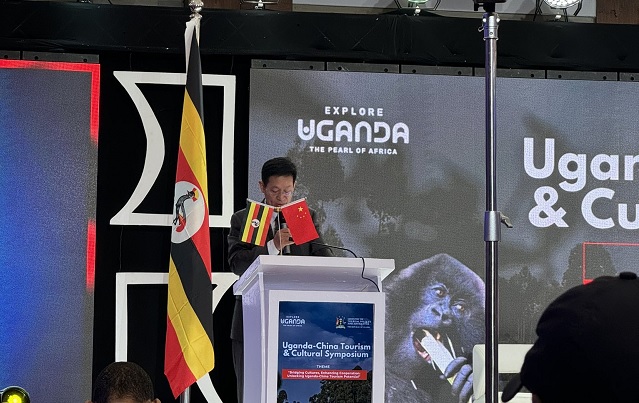Uganda, China hold symposium to boost tourism, cultural exchange
Uganda, China hold symposium to boost tourism, cultural exchange and attract more Chinese tourists to Uganda
Chinese Ambassador to Uganda Zhang Lizhong says China is willing to work closely with Uganda to expand tourism cooperation
harness tourisms potential to promote socioeconomic transformation
and attract more Chinese tourists to Uganda to further enhance people-to-people and cultural exchanges.
January 23, Kampala (Xinhua) — In an effort to foster cultural interaction and tourism development
China and Uganda held a one-day symposium in Kampala, the capital of the African nation.
Under the theme “Bridging Cultures, Enhancing Cooperation: Unlocking Uganda-China Tourism Potential,” the first Uganda-China Tourism and Cultural Symposium convened on Tuesday, bringing together tour operators, government representatives, and stakeholders from the East African, Chinese, and Ugandan tourism industries.
Emphasizing the several ways that China and Uganda may work together to promote tourism,
Ugandan Minister of Tourism, Wildlife, and Antiquities
Tom Butime said both sides could tap the potential of their cultural heritage and scenic attractions to advance the development of the two countries.
Uganda is eager to tap into China’s booming outbound tourism market, drawing inspiration from China’s successful domestic tourism strategies while exploring investment opportunities in the sector, the minister said. “Uganda places great importance on the Chinese market, which represents a valuable opportunity to grow our tourism sector. China’s rich cultural heritage and rapidly growing outbound tourism make it a natural partner for us as we strive to develop new tourism products,” the minister said. Chinese Ambassador to Uganda Zhang Lizhong said the symposium represents a significant milestone in Uganda-China cooperation within the tourism sector, infusing new
Uganda, China hold symposium to boost tourism
“China is willing to work with Uganda closely to deepen tourism cooperation, tap the potentials of tourism in promoting social economic transformation, and encourage more Chinese tourists to visit Uganda to further enhance cultural and people-to-people exchanges,” Zhang said. “Despite different traditions, both countries share a vision of integrating history, culture, and modern civilization into tourism development.”
He added that in China tourism is essential for reducing poverty, generating employment opportunities
and increasing foreign exchange earnings—all of which drive economic growth and social progress.
A new age of strategic opportunity for partnership is beginning.
He underlined the necessity for Uganda to step up its efforts to coordinate policies and promote tourism in order to reach the Chinese market. This involves planning travel-related seminars, exhibitions, and marketing activities in China. In order to support the promotion of tourism, Dai also recommended that Uganda make use of the “friendly cities” system of collaboration between Chinese and Ugandan cities.
There was also an exhibition at the conference where Ugandan tour operators displayed their goods.
The occasion was made more lively with cultural acts,
such as a traditional Chinese lion dance and a showcase of traditional Chinese and Ugandan clothing.
According to the Ugandan ministry,
tourism is the country’s top source of foreign exchange earnings, bringing in over $1 billion a year.
Compiled by,
World Travel News, Gorilla Trekking Uganda and Gorilla Trekking Rwanda


